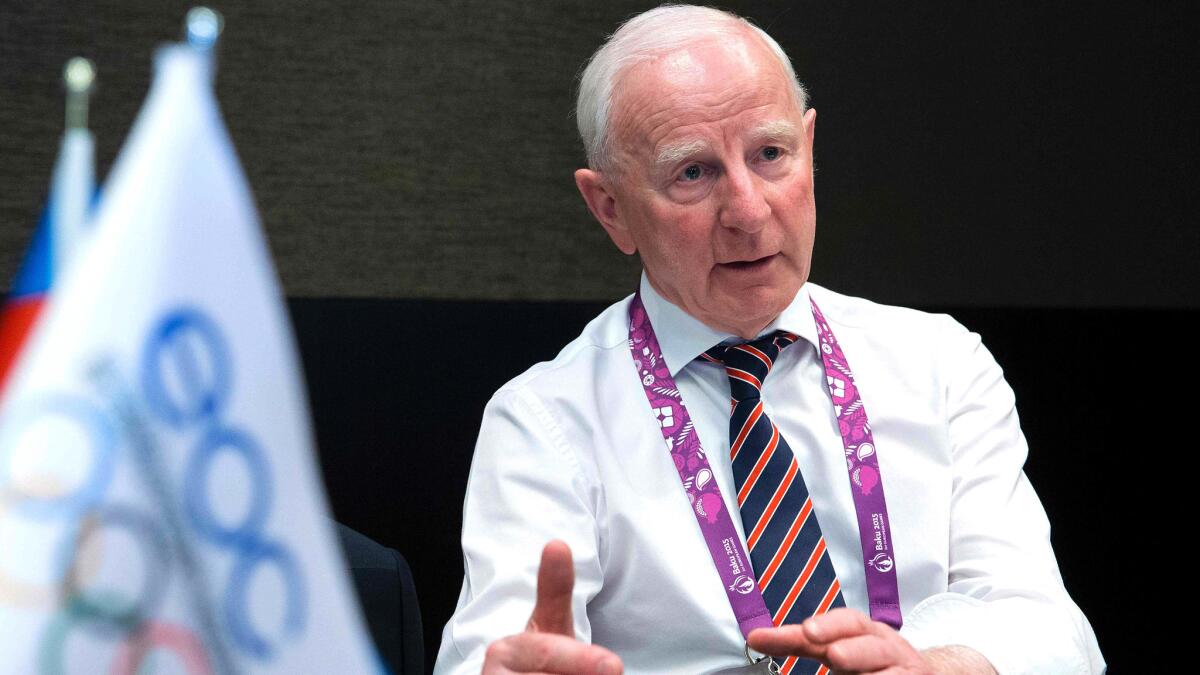A naked official, a military exemption and a bigtime underachiever

A look back at Day 12 of competition at the Rio Olympics.
The Irish Rover
“Is the IOC concerned that one of the enduring images from these Games may well be one of its senior members opening the door naked to a police raid?”
Wow, the question by an Australian journalist was one catchy way to start a news conference. The Rio Games, which seem to have an unlimited capacity for things going wrong, actually caught a break Wednesday when the finger pointing was at the International Olympic Committee and a ticket-scalping controversy.
It seems that Patrick Hickey, Europe’s top Olympic official, was being arrested for his involvement in a ticket reselling operation. That on its face is funny because how do you scalp tickets when the venues are nowhere near capacity? Where’s the demand?
Actually, it was alleged that he sold 800 Irish committee tickets, mostly to the opening ceremony, to someone who would then resell them at a huge profit. $3 million in profit. to be exact.
When the police arrived at his hotel room, Hickey’s wife said her husband had gone back to Ireland, where he is head of that country’s Olympic committee. But a search of the next room found him answering a knock au naturel, his body shielded by the partially opened door. He was allowed to go in the bathroom and grab a robe.
The best IOC apologist/spokesman Mark Adams could come up with was the innocent-until-proven-guilty excuse.
Hickey was then taken to a hospital because of an alleged bad heart. He’s in police custody, though. The Ireland Olympic Committee said Hickey would “step aside temporarily.”
st were glad he didn’t step aside when he was behind that door.
The boys of the old brigade
PyeongChang, South Korea, is hosting the next Olympics, the 2018 Winter Games.eal Olympics, mind you, but a Winter Olympics, You know, sort of an X-Games exhibition with a few traditional sports like skiing, figure skating and hockey thrown in for the fun of it.
So, why talk about South Korea, which has has done rather well in Rio with 16 medals, seven of them gold. It seems they have one of those not-so-secret codicils of Faber College (look it up) that if you win an Olympic medal you get to skip the mandatory two years of military service. Not a problem in the U.S., since the draft died with amateurism in the Olympics.
There are about 80 athletes that have taken advantage of this. A lot of young guys were hoping the soccer team was going to cash in on that but, alas, a loss to Honduras in the quarterfinals took care of that.
A nation once again
Staying along an international theme, you have to ask: What gives, India?
It’s the second-largest country in the world with a population of about 1.3 billion and it has one medal, a bronze in wrestling it won Wednesday. You don’t need your Caltech degree to see that’s one medal for every 1.3 billion people.
So, how does the rest of the world stack up? China with 54 medals has one for about every 25 million people. The United States, with 93 medals, can claim one for every 3.5 million people. Our hosts in Brazil have 12 medals, one for every 17.5 million.
The overachiever is Britain, which has been pretty Great, with 50 medals, one for every 1.28 million. Nineteen of the medals are gold, which is tied for China for the second-most at Rio and two more than the Beatles had No. 1 songs.
However, you really can’t get all over India’s case when you look at how a country as large and talented as the U.S. can be so bad in men’s soccer.
The ballad of …
Track and field athlete Darya Klishina could become a Trivial Pursuit question in Russia, as the only Russian athlete cleared by the IAAF to participate in these Games.
She’s a long jumper, but apparently not a great one. She finished ninth Wednesday, meaning it’s the first time since Russia split off on its own for the 1996 Olympics that it didn’t win a medal in track.
Klishna was given a pass because she mostly trains in the U.S. and had passed all her drug tests. The IAAF initially said no but she won her case in arbitration.
Help provided by Times staff writers Kevin Baxter, Lisa Dillman, Helene Elliott, Nathan Fenno, Bill Plaschke and David Wharton.
Go beyond the scoreboard
Get the latest on L.A.'s teams in the daily Sports Report newsletter.
You may occasionally receive promotional content from the Los Angeles Times.




